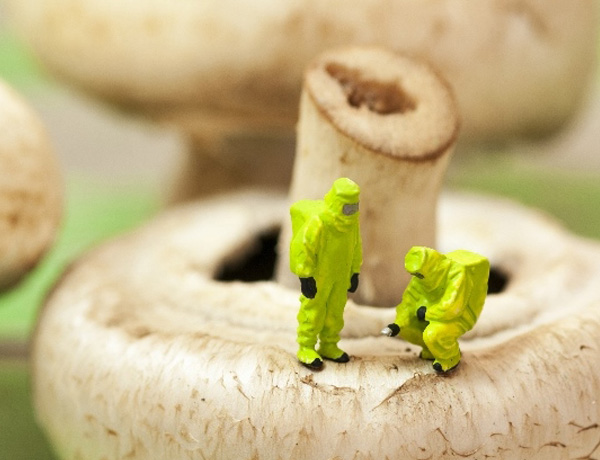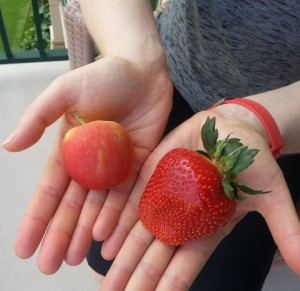Why Should I Eat Organic?
It’s a common question and I do advise my clients to eat as much organic food as possible, for good reason….
Firstly I have to admit I wasn’t a quick convert as I thought it was so expensive, especially here in Australia where groceries are already costly as compared to my native UK. I’d also seen the studies which showed there wasn’t a significant difference between the nutritional content of selected non organic and organic vegetables. I was eating a good balanced diet high in plant foods, quality protein and otherwise looking after myself as any good nutritionist/naturopath would do. So surely that would be enough…well, unfortunately not and one big health scare later and I started to embrace the organic way.
Here are my top three reasons to go organic:
It’s not all about the ‘nutrients’. There are little things in fruit and vegetables called phytochemicals, which is a collective name for compounds which haven’t been classed as a traditional nutrient but we know they have a beneficial role in our bodies with protective or disease preventive properties. They are often as potent anti-oxidants protecting us from oxidative damage which can play a role the development of cardiovascular disease and cancers. Although tiny you sometimes see these phytochemicals as they can be responsible for the bright colours in plant foods. You may also have heard of some of them before such as lycopene found in tomatoes or resveratrol found in red grapes, the latter being hailed as a potent anti-aging compound which was quickly used as a marketing buzz word for anti-aging creams and supplements. But before you rush out and buy this we also now know that it isn’t well absorbed in supplement form so sticking to sources in nature is best.
That’s where organic food comes into play, these chemicals are important to the plant because they are often antibacterial and anti-fungal agents therefore acting as the natural defence against premature decay. So what happens when we spray foods with pesticides? Well, the plant no longer needs to activate its own defences and so doesn’t produce the phytochemicals in the same quantities, in fact non organic food contains much lower amounts. Organic produce has much higher levels of protective chemicals and is the reason why you should always eat a rainbow coloured diet, including the skin if the plant, the more varied the phytochemical intake the better!
Pesticides and insecticides are toxic. Sure, they enable our fresh travel hundreds of miles, survive a distribution chain and look pretty once it arrives on the supermarket shelf. But really are we so obsessed about appearances that our vegetables need to look perfect? Apart from messing up our land and diminishing nutritional content, these chemicals add to our daily ‘toxic load’, meaning they need to be broken down and processed by our liver into less dangerous compounds. Hurrah for the liver but sadly it’s often getting over worked. Apart from all the caffeine, alcohol, artificial sweeteners, colourings and pharmaceutical drugs, we live in a much more toxic world than our ancestors so our everyday environment is full of toxins from passive smoke, car fumes, radiation etc.
Make a difference to your liver where you can – avoid the insecticides and pesticides and eat organic.
Wouldn’t you prefer to eat produce from happy healthy animals? I don’t eat meat for my own health reasons but I do see its nutritional value in the average balanced diet. Choosing organic meat, eggs and dairy is more expensive so I encourage you to think ‘quality over quantity’ and spend your money wisely. Also, consider what we used to do when food was scarcer by making the most of the animal. For example, buy a whole chicken, roast it for dinner and then use the carcass to make a delicious stock which can be turned into an immune boosting soup.
Sadly today’s intensive meat production is meeting the demand for ‘quantity over quality’ and is a far cry from farming practices of years ago. Choosing organic gives us the opportunity to eat better quality animal produce which tastes better because it has lived better. Organic livestock production practices require the producer to establish preventative health care practices, providing adequate feed, create an appropriate environment that minimizes stress and disease. Organic producers cannot provide preventative antibiotics or administer hormones or other drugs for growth promotion. When used in animal farming these drugs remain in the tissues of the meat, milk or eggs and once ingested can accumulate in your body, potentially interfere with your own hormonal balance or create resistance to antibiotics.
I know it’s a commitment both financially and time wise, so here’s are my top tips for making the switch a little easier:
Buy grains, nuts and seeds in bulk. Start looking for a market or independent retailer selling in bulk and make a trip every couple of months to stock up on items which have a longer shelf life.
Eat seasonal fruit and vegetables and check online for home deliveries. Mixed seasonal boxes can be a cost effective way to get your produce and the convenience of home delivery means you can spend more time getting creative in the kitchen. I use Yum Organics www.yumorganics.com who deliver around Melbourne.
Check out your local farmers markets, if you don’t have access to organic foods try to find local producers – if produce hasn’t had far to travel then it will have had time to ripen naturally (developing more of those useful phytochemicals) and less travel time generally means less chemicals.
Be savvy in the supermarket. Thankfully there is a bit more reasonably priced organic produce available in the supermarkets so top up here when needed.
Prioritise – below is a list of fruits and vegetables, courtesy of the environmental working group www.ewg.com, which are best eaten as organic (the dirty dozen) or are relatively ‘clean’:
| The Dirty Dozen(in order of contamination) | The Clean 15 (in order of least contamination) |
| Apples | Onions |
| Celery | Sweet Corn |
| Sweet bell peppers | Pineapples |
| Peaches | Avocado |
| Strawberries | Cabbage |
| Nectarines | Sweet peas |
| Grapes | Asparagus |
| Spinach | Mangoes |
| Lettuce | Eggplant |
| Cucumbers | Kiwi |
| Blueberries | Cantaloupe |
| Potatoes | Sweet potatoes |
| Grapefruit | |
| Watermelon | |
| Mushrooms |
Going organic is one of the easiest ways to invest in your health on a daily basis and support better farming practices. For me it’s worth it.


